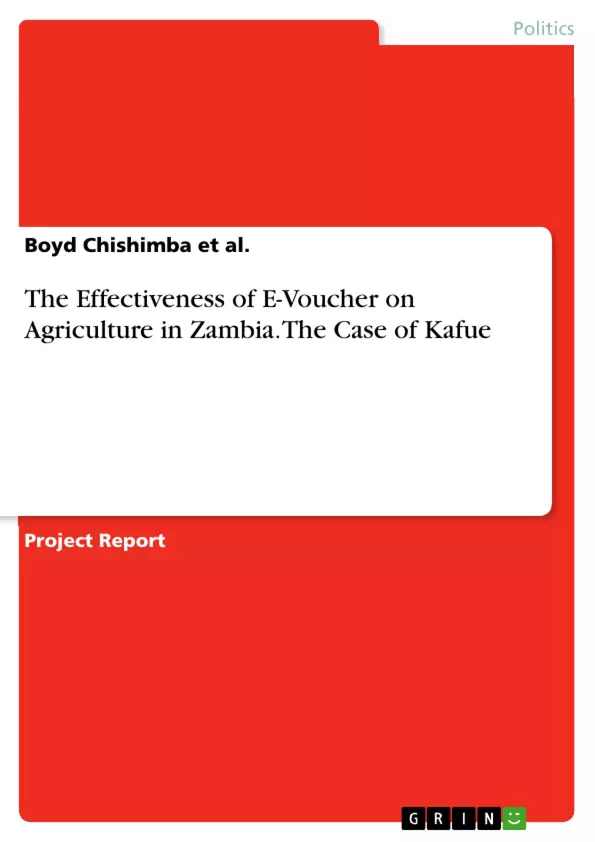This report is based on an evaluation study aimed at evaluating the effectiveness of the e-voucher on agriculture in Zambia, conducted in Mungu village, Kafue.
The projects goal is to reduce the number of street children on the streets which is done by providing counselling sessions, sensitization and free basic education for the children. This evaluation adopted the Utilization-Focused Approach to Evaluation developed by Michael Quinn Patton. The evaluation design used cross sectional non-experimental. The study used a semi-structured interview schedule guided by a self-administered questionnaire with both closed and open-ended questions in order to collect both quantitative and qualitative data. Forty individuals participated in the survey; which included members of staff, beneficiaries, parents and guardians of the beneficiaries who were randomly selected using purposive sampling. The implementation is well in the sense that 92 percent of the intended beneficiaries are receiving services which satisfy them. Sixty-four percent of beneficiaries were willing to be reunified with their families.
Furthermore, between 2015 and mid-2017, 520 have been reintegrated with their families. For the programmes to be fully implemented, school management should recruit more teachers to reduce the teacher pupil ratio to ensure quality service delivery, the organization should continue to explore local level advocacy opportunities for accessing funds for infrastructure improvement and construction of additional class room blocks, office space and dormitories, and must include professional orientation to develop and strengthen the children’s professional aspirations.
Inhaltsverzeichnis (Table of Contents)
- 1.0 INTRODUCTION
- 1.1 BACKGROUND
- 1.2 PROBLEM STATEMENT.
- 1.3 RESEARCH OBJECTIVES
- 1.3.1 General Objective
- 1.3.2 Specific Objectives.
- 1.4 RESEARCH QUESTIONS..
- 1.5 RATIONALE.
- 1.6 ETHICAL CONSIDERATIONS.
- 2.0 LITEREATURE REVIEW.
- 3.0 METHODOLOGY
- LIMITATIONS OF THE STUDY.
- 3.1 STUDY LOCATION.
- 3.2 DATA COLLECTION
- 3.2.1 Target Groups
- 3.2.2 Sampling Technique
- 3.2.3 Research Methods.
- 3.2.4 Data Collection Tools
- 3.3 DATA ANALYSIS.
- 4.0 PRESENTATION AND DISCUSSION OF FINDINGS
- 4.1 PRESENTATION OF FINDINGS
- 4.1.1 Introduction….........
- 4.1.2 Socio-demographic Background........
- 4.1.3 Operation of the E-voucher System.
- 4.1.4 Accessibility of Farming Inputs Under E-voucher
- 4.1.5 Selection Criteria for Beneficiary Farmers and Agro-dealers......
- 4.2 DISCUSSION OF FINDINGS
- 4.2.1 To investigate whether the E-voucher system has improved smallholder farmers' access to a variety of farming inputs..
- 4.2.2 To establish the involvement of the private sector through the E-voucher system in the distribution of farming inputs to smallholder farmers.
- 5.0 CONCLUSION.
- 6.0 LIMITATIONS/CHALLENGES OF THE E-VOUCHER SYSTEM.
- 37.0 RECOMMENDATIONS.
- REFERENCES
- WORK PLAN.
- BUDGET
Zielsetzung und Themenschwerpunkte (Objectives and Key Themes)
This research proposal aims to evaluate the effectiveness of the e-voucher system in improving smallholder farmers' access to agricultural inputs in Zambia, focusing on the case study of Mungu village in Kafue. The research utilizes the Utilization-Focused Approach to Evaluation developed by Michael Quinn Patton. The study aims to provide insights into the impact of the e-voucher system on farming practices, access to inputs, and the involvement of the private sector in the agricultural supply chain.
- Effectiveness of the e-voucher system in enhancing smallholder farmers' access to agricultural inputs
- The impact of the e-voucher system on farming practices and agricultural outcomes
- The role of the private sector in the distribution of farming inputs through the e-voucher system
- Socio-demographic characteristics of beneficiary farmers and their involvement in the program
- Challenges and limitations associated with the implementation and effectiveness of the e-voucher system
Zusammenfassung der Kapitel (Chapter Summaries)
The introduction provides background information on the e-voucher system in Zambia and outlines the research objectives and questions. Chapter two delves into the literature review, examining existing research on e-voucher programs and their impact on agriculture. Chapter three elaborates on the research methodology, including the study location, data collection methods, and data analysis techniques. Chapter four presents and discusses the findings of the study, analyzing the effectiveness of the e-voucher system, the involvement of the private sector, and the socio-demographic characteristics of beneficiary farmers. The conclusion summarizes the key findings and discusses the implications of the study for policy and practice. Finally, the report provides recommendations for improving the effectiveness of the e-voucher system and addressing the challenges encountered during its implementation.
Schlüsselwörter (Keywords)
This study examines the effectiveness of the e-voucher system in improving smallholder farmers' access to agricultural inputs in Zambia, focusing on the case study of Mungu village in Kafue. Key themes include agricultural input access, e-voucher program effectiveness, private sector involvement, farmer demographics, and program challenges. The research employs the Utilization-Focused Approach to Evaluation developed by Michael Quinn Patton. The study provides insights into the impact of the e-voucher system on farming practices, agricultural outcomes, and the agricultural supply chain.
Frequently Asked Questions
What is the e-voucher system in Zambian agriculture?
The e-voucher system is a digital mechanism used to provide smallholder farmers with access to a variety of agricultural inputs through private sector dealers.
Was the e-voucher system effective in Kafue?
The evaluation showed that 92 percent of intended beneficiaries received services they were satisfied with, though challenges in implementation remain.
How does the private sector participate in this program?
The system involves agro-dealers in the distribution of inputs, aiming to strengthen the agricultural supply chain through private sector involvement.
What are the main challenges of the e-voucher system?
Challenges include technical issues, infrastructure limitations, and the need for better orientation for both farmers and dealers.
What evaluation approach was used for this study?
The study adopted the Utilization-Focused Approach to Evaluation developed by Michael Quinn Patton.
- Quote paper
- Boyd Chishimba et al. (Author), 2018, The Effectiveness of E-Voucher on Agriculture in Zambia. The Case of Kafue, Munich, GRIN Verlag, https://www.grin.com/document/418640



